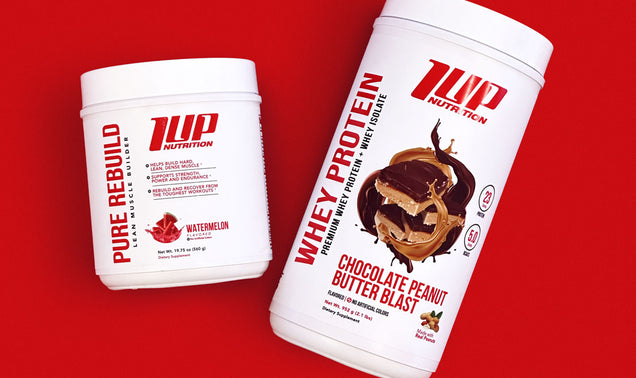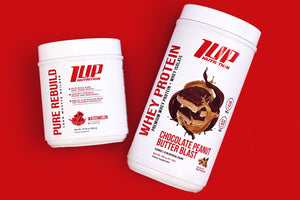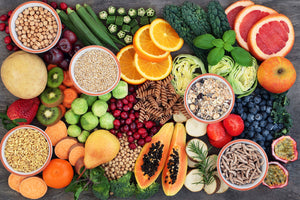No doubt you’ve heard about inflammation, and while it’s often discussed as being something negative. The truth is that it isn’t that simple. Inflammation is an essential function and actually is beneficial in certain cases.
Today, we give a primer on inflammation (when it’s necessary -- good -- and when it’s bad) as well as discuss the link between inflammation, nutrition, and immune support.
Let’s start with the basics…
What is Inflammation?
Inflammation is the body’s immune system response to an irritant, such as an infection, toxin, or injury. In other words, when something damages your cells, the body releases various chemicals that activate the immune system.
A classic example of this in the world of fitness is the inflammation that occurs after an intense training session. Strenuous exercise creates microtears in muscle fibers, and in response to this “injury” the body releases substances, including proteins and antibodies that increase blood flow to the area.
This type of inflammation is not only necessary, but beneficial as it allows the muscle fibers to repair, recovery, andgrow.
In instances of acute inflammation, the process only lasts for a few hours or days. Common symptoms of acute inflammation include swelling, redness, and tenderness.
When inflammation goes “bad” is when it becomes chronic.
Chronic inflammation occurs when the body’s inflammatory response is activated and remains in a state of constant alert. Left unchecked, chronic inflammation can have deleterious effects on your tissues, organs, and cardiometabolic health.
Some research even indicates that chronic inflammation may play a role in a variety of disorders and diseases.[2,3]
Chronic inflammation lasts for prolonged periods of several months to years.
The Relationship Between Nutrition and Chronic Inflammation
A number of factors can contribute to a state of chronic inflammation, including diet and body fat levels.
Therefore, one of the best things an individual can do to lower levels of chronic inflammation is to lose weight.[3]
Additionally, avoiding highly-processed foods that are high in added sugars and fats is also important. Researchers note that the intake of synthetic trans-fats (partially hydrogenated oils) aggravates inflammation, while omega-3 fats (like the kind found in 1UP Omega-3) appear to be anti-inflammatory.[3]
Eating a healthy, well-balanced diet rich in whole foods like fruits, vegetables, whole grains, lean proteins, nuts, seeds, legumes, and healthy fats can play a massive role in promoting a healthy inflammatory response and significantly reducing the risk for chronic lifestyle diseases associated with chronic inflammation.
Fruits and vegetables, in particular, are rich in natural antioxidants and polyphenols as well as other anti-inflammatory compounds, which may offer protection against inflammation.[3]
This is one of the many reasons that we created 1UP Greens & Reds, which contains a mix of 19 organic fruits and vegetables in every scoop! 1UP Greens & Reds is naturally rich in antioxidants and other assorted phytocompounds that support immune system function, metabolism, and digestive health.
Additionally, other certain supplements are indicated in research to help combat inflammation, including fish oil, curcumin, and green tea as well as essential micronutrients, including vitamin D and magnesium.
In fact, magnesium is regarded one of the top anti-inflammatory dietary factors and is is associated with reductions in inflammatory biomarkers, including of hsCRP, IL-6, and TNF-alpha activity.[3]
Additionally, Vitamin D exerts anti-inflammatory activity by suppressing inflammatory mediators such as prostaglandins and nuclear factor kappa-light-chain-enhancer of activated B cells.[3]
Our women’s and men’s multi-vitamins (1Up Multi-GO Women & Multi-GO Men) contain quality doses of both magnesium and Vitamin D as well as all the other essential vitamins and minerals to support health and wellness.
Additional supplements that may be beneficial for promoting a healthy inflammatory response, include turmeric, white willow, hyaluronic acid and Boswellia serrata, each of which are included in our new Joint Health Plus.
Foods That Support Healthy Inflammation
As we mentioned above, nutrition plays an essential role in promoting a healthy inflammatory response in the body.
Here are a few suggestions to add to your diet:
- Fruits: Blueberries, blackberries, strawberries, cherries
- Leafy greens: spinach, kale, collard greens
- Fatty fish: Wild Alaskan salmon, mackerel, sardines
- Green and black tea
- Olive oil
- Avocado
- Walnuts
- Almonds
- Spices: turmeric, ginger, black pepper, cayenne pepper
Foods to avoid/limit in your diet when looking to promote a healthy inflammatory response include:
- Fried foods
- Packaged food (chips, candy, cookies, baked goods, etc.)
- Soda and other beverages with lots of added sugar
- Processed meats (i.e. cold cuts)
Takeaway
Inflammation often gets a bad rap, but the truth is a normal (and essential) component of the body’s response to injury as well as its ability to fight pathogens, including bacteria and other microscopic ne’er-do-wells that seek to invade and harm our bodies.
The best things you can do to promote a healthy inflammatory response is to maintain a healthy body weight, exercise regularly, and eat a healthy diet, rich in fruits, vegetables, whole grains, and lean proteins (especially fatty fish like salmon).
Adding supplements into the mix, such as a Red & Greens formula, Joint Support formula, and/or multi-vitamin, can further help augment your intake of nutrients shown to support a healthy inflammatory response and immune system function.
References
- InformedHealth.org [Internet]. Cologne, Germany: Institute for Quality and Efficiency in Health Care (IQWiG); 2006-. What is an inflammation? 2010 Nov 23 [Updated 2018 Feb 22]. Available from: https://www.ncbi.nlm.nih.gov/books/NBK279298/
- Furman, D., Campisi, J., Verdin, E. et al. Chronic inflammation in the etiology of disease across the life span. Nat Med 25, 1822–1832 (2019). https://doi.org/10.1038/s41591-019-0675-0
- Pahwa R, Goyal A, Bansal P, et al. Chronic Inflammation. [Updated 2020 Nov 20]. In: StatPearls [Internet]. Treasure Island (FL): StatPearls Publishing; 2021 Jan-. Available from: https://www.ncbi.nlm.nih.gov/books/NBK493173/






